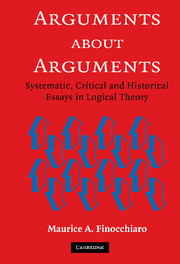Book contents
- Frontmatter
- Contents
- Preface and Acknowledgments
- Introduction : An Approach to a Branch of Logic
- Theorizing about reasoning and argument
- Fallacies and asymmetries
- Critiques
- 10 Siegel on Critical Thinking : Reasoning versus Rationality versus Criticism (1989)
- 11 Induction and Intuition in the Normative Study of Reasoning : Cohen on Inductive Reasoning in Philosophy (1991)
- 12 Logic, Politics, and Gramsci
- 13 The Dialectical Approach to Interpretation and Evaluation : From Axiom to Dialogue (Barth) and from Structure to Dialogue (Freeman) (1995)
- 14 The Port-Royal Logic's Theory of Argument
- 15 A Critique of the Dialectical Approach, Part Ⅱ : The Amsterdam School and Walton on Complex Dialogues (1999)
- 16 Valid Ad Hominem Arguments in Philosophy
- 17 Dialectics, Evaluation, and Argument : Goldman and Johnson on the Concept of Argument (2003)
- Historical analyses
- Selected Bibliography
- Index
12 - Logic, Politics, and Gramsci
Intellectuals, Dialectics, and Philosophy; in the Prison Notebooks (1992)
from Critiques
Published online by Cambridge University Press: 05 February 2015
- Frontmatter
- Contents
- Preface and Acknowledgments
- Introduction : An Approach to a Branch of Logic
- Theorizing about reasoning and argument
- Fallacies and asymmetries
- Critiques
- 10 Siegel on Critical Thinking : Reasoning versus Rationality versus Criticism (1989)
- 11 Induction and Intuition in the Normative Study of Reasoning : Cohen on Inductive Reasoning in Philosophy (1991)
- 12 Logic, Politics, and Gramsci
- 13 The Dialectical Approach to Interpretation and Evaluation : From Axiom to Dialogue (Barth) and from Structure to Dialogue (Freeman) (1995)
- 14 The Port-Royal Logic's Theory of Argument
- 15 A Critique of the Dialectical Approach, Part Ⅱ : The Amsterdam School and Walton on Complex Dialogues (1999)
- 16 Valid Ad Hominem Arguments in Philosophy
- 17 Dialectics, Evaluation, and Argument : Goldman and Johnson on the Concept of Argument (2003)
- Historical analyses
- Selected Bibliography
- Index
Summary
Introduction
The aim of this chapter is to explore the ways in which the work of Antonio Gramsci may be fruitful for a proper understanding of the nature and relationship of logic and politics.
First, without denying the existence of other conceptions, I would want to advocate conceiving logic as the judiciously empirical study of reasoning and argument. As long as we do not equate the notion of the empirical with the excesses of empiricism or with the experimental method of cognitive psychologists, I believe this to be a very fruitful approach. In this enterprise which corresponds in large measure to what is called “empirical logic” by some and “informal logic” by others, one may follow an historical approach in which one studies reasoning and argument as these occur in some appropriately chosen book such as Galileo Galilei's Dialogue on the Two Chief World Systems or Lenin's What Is to Be Done? or Spinoza's Ethics. From the viewpoint of such an historical approach to empirical or informal logic, the potential fruitfulness of Gramsci becomes apparent once one realizes that he is the author of a modern classic of political and social thought, namely the Prison Notebooks. This means that his work becomes susceptible of being studied in order to determine what logical patterns it exhibits, to what extent these patterns are generalizable to political thought in general, and how they compare and contrast with other patterns of reasoning in other fields.
Information
- Type
- Chapter
- Information
- Arguments about ArgumentsSystematic, Critical, and Historical Essays In Logical Theory, pp. 207 - 230Publisher: Cambridge University PressPrint publication year: 2005
